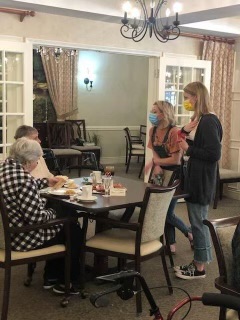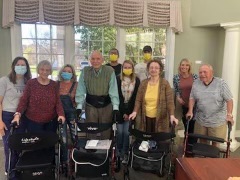COOKEVILLE – Students in the Clinical Immersion at Disciplinary Interfaces course at Tennessee Tech University combines different disciplines to find solutions to real world problems. This semester, a team in the course designed safety features for rolling walkers.
“The plethora of types and styles of walkers amazed this team of students. They focused on one known as a ‘rollator’ because of the safety issues,” Melissa Geist, professor of nursing, said.
As part of their customer discovery, seeing how people use these walkers in real life, the students spent time at Heritage Pointe Senior Living talking to residents about their experiences.
“The issue we found with the standard walker was its inability to stay locked without manual pressure. This poses a fall risk for the user,” Kate Tyler, senior nursing student, said. “Additionally, the pressure required for the brakes can be difficult if the user has grip issues, such as arthritis.”
The course itself combines several disciplines. It brings nursing, engineering and pre-professional health students together to identify problems in healthcare, and then develop solutions/prototypes responsive to the problem.
The course was launched in 2015 thanks to the collaborative efforts of Robby Sanders, associate professor of chemical engineering and Geist, with funding from VentureWell. They are in their seventh semester.
“The course is ‘full-on’ inquiry-based,” Geist said. “We put the students in positions to discover problems; usually, this means teams of nurses and engineers doing rotations through different units at CRMC (Cookeville Regional Medical Center). We’ve had to modify that experience due to COVID.”
Students are not told what projects to pursue. They explore many options based on their clinical experiences, and then decide what they want to pursue. The students have to interview stakeholders (nurses, paramedics, respiratory therapists, etc.) to discover problems, and then make strategic choices about what to “solve” during the semester.
“I think as a team we chose the walker project because it was a relatively simple fix but would still make an overall big improvement,” Tyler said. “I feel the project will be beneficial. It’s safer and more user-friendly.”
“Dr. Sanders, Dr. Pardue and I mentor, but the students make the decisions,” Geist said. “There are many times students go down rabbit holes or down a path we know might not be best; however, we like the students to discover that they are on the wrong track as opposed to us telling them. Those mistakes become incredibly valuable learning experiences.”
Every team pursues a different project based on their clinical experiences and what they discover from the initial interviews and interactions with healthcare providers. The projects are entirely student-driven. This semester there were four teams trying to find solutions to four very different problems.

A team chose walkers as a project this semester after Geist mentioned that her 85-year-old mother had fallen in January while using her rolling walker. The team chose Heritage Point to do their research because Geist’s mother lives there and she has a relationship with the owner/director.
What happens after a project is finished is different each semester and with each team; it depends upon the team.
“Sometimes, nothing happens, which we don’t like. Sometimes Dr. Pardue and his mechanical engineering capstone students pick up a project our teams have started and move it forward,” Geist said. “The best thing is that we have had several projects win entrepreneurship and innovation competitions and even go on to form businesses.”
Geist and Sanders encourage the teams to participate in Tech’s EagleWorks and national competitions like the Lemelson-MIT Student Design competition. One of the teams from a couple of years ago was a national finalist in that competition.
“We’ve had several submit grant proposals to the VentureWell e-Team program,” Geist said. “We would like for them to find funding to hire IP lawyers and marketing professionals to eventually get the products into the hands of people who need them.”
There are graded assignments throughout the semester and every team develops a teamwork contract that they use to evaluate their teammates’ teamwork. It holds everyone accountable to a set of standards agreed to by the team at the beginning of the semester.
“These students form teams as strangers and by the end of the semester, they’ve become friends,” Geist said. “I don’t think there is another class at TTU that brings such different disciplines together like this. Dr. Sanders and I love watching the team bond and have fun over the course of the semester.”
“I took this course because I really liked the multidisciplinary aspect. I enjoyed the idea of working alongside engineers and working to create something useful. Additionally, I heard this was a fun class,” Tyler said.
“We’ve had some amazing experiences – one being the US Mission to Cuba Grant. Along with a former colleague, Dr. Marbin Pazos-Revilla, we ran this course in Havana, Cuba. Nursing and engineering students from TTU teamed with engineering students from CUJAE (the main engineering university in Cuba) to interact with senior citizens in Cuba and to build low-budget prototypes of devices to help them with their expressed needs,” Geist said. “One group from this experience developed an exercise glove to help people maintain the range of motion of arthritic hands. This group, along with a mechanical engineer who joined the team after the trip, won Eagle Works, placed 2nd or 3rd in the 36/86 TN State student Entrepreneurship contest and launched a business.”
For the students, it is an opportunity to grow academically in often unexpected ways.
“I thought the course was great,” Tyler said. “It is unlike any course I’ve ever taken; it’s independently driven. It pushed me out of my comfort zone with public speaking and encouraged critical thinking. I worked with a great team of engineers and loved getting to know them.”









